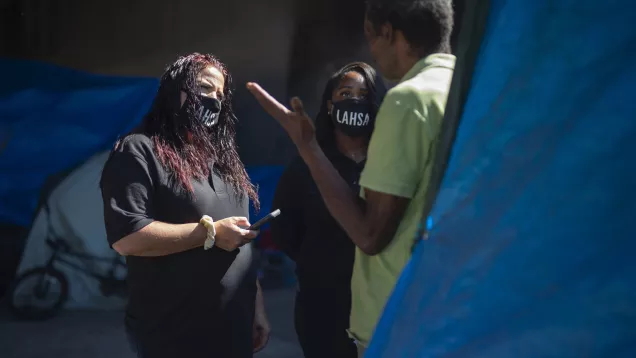
Look around and ask anyone -- your friend, your family member, your neighbor, or even the owner of the local coffee shop where you grab your morning coffee and they’ll likely say the same thing: homelessness in our city has become more than a problem, it's now the defining moral crisis of our time.
They’re not wrong and your eyes aren’t deceiving you.
Whether you are in South LA, the San Fernando Valley, Skid Row or San Pedro, walking down the street forces all of us to not just ask the question of how things could have possibly gone so wrong and gotten so bad, but what are we doing differently to address this.
Despite housing more than 22,000 people in 2019 (most recent year data available), despite moving nearly 5,000 Angelenos from the streets into hotel rooms through Project Roomkey amid the covid-19 pandemic, and despite the City creating housing stability for close to 50,000 low-income households through rent subsidies during the COVID-19 pandemic, results have not reached far enough. The images on the streets tell a far different story and it’s unacceptable. We simply must work harder, smarter, and faster.
Last week, United States District Court Judge David O. Carter asked both the City and County of Los Angeles to consider the power of the Court to act when a local government’s response to an emergency such as homelessness has been inadequate.
The answer to this question remains to be determined, but what we do know is that the opportunity lies with Judge Carter’s gavel to raise the standard by which we are compelled as Los Angeles public officials to take on homelessness with the scale and significance that is warranted.
What the data and our experience tell us is that the system we have will work, if we have the resources to meet the moment.
For instance, in 2015, the various agencies across the County were responsible for helping 11,000 people transition out of homelessness.
Four years later, after Measure H was passed, and an additional $350 million was infused into our safety net operations, we more than doubled the number of people that could be helped.
But now, every day in Los Angeles, 207 people leave the streets, but 227 more fall in. This demonstrates that we know how to help people, but the problem has substantially outgrown our working capacity.
How do we meet this growing need?
If local leaders truly want to be in charge of addressing this crisis, there are structural issues that we will need to confront. The uncomfortable truth is that we won’t do it until there is a legal mandate to do it.
Until there is a Right to Housing.
Once established, a Right to Housing framework provides guiding principles on how to allocate resources and institute protections, especially when a government is faced with difficult decisions in the midst of a financial crisis. Only under this legal obligation will adequate resources from our budgets be re-prioritized to treat this for what it is, an unprecedented crisis—second only to covid-19. This can no longer be a voluntary effort, wherein implementation is discretionary or negotiable.
When the pandemic is behind us, homelessness in all of its tragedy and travesty will be staring back at us.
I’ve put forth a motion before the City of Los Angeles’ Homeless and Poverty Committee, to move in the direction of a right to housing. We must create accountability coupled with the resources and legal obligation necessary to scale up our response with the urgency it requires.
Establishing a Right to Housing is the right path forward.
Judge Carter, you can help us get there.
Mark Ridley-Thomas is a Los Angeles Council Member and serves as Chair of the LA City Council Homelessness and Poverty Committee, Co-Chair of CA Governor Gavin Newsom’s Council of Regional Homeless Advisors, and principal author of LA County’s Measure H.
Also published in The Daily News.